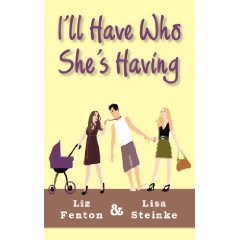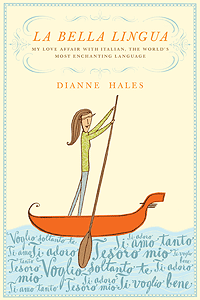Archive for the ‘books’ Category
La Bella Lingua by Dianne Hales
For anyone who has been enchanted by the always beautiful, often frustrating Italian language and tried to grasp its basics as well as its intricacies, Dianne’s tales will not only ring true but also comfort you.
Read on...GoodReads: Social Media for Booklovers
 People often ask me whether I get bored living in a medieval village. I suppose plenty of others might under similar circumstances, but when I’m not working, I always manage to find something to do whether it involves dogs, goats, or engaging in one of my oldest and most favoritest hobbies: reading.
People often ask me whether I get bored living in a medieval village. I suppose plenty of others might under similar circumstances, but when I’m not working, I always manage to find something to do whether it involves dogs, goats, or engaging in one of my oldest and most favoritest hobbies: reading.
Over the Easter vacation, I devoured three books, and it felt wonderful since it’s been a while since I’ve had quality, concentrated reading time like that. What did I read?
- Too Much Tuscan Wine by Dario Castagno
- Love Walked In by Marisa de los Santos
- Waiting by Ha Jin
I loveloveloved the first, *really* liked the second, and just liked the third, but they are all definitely worth reading.
I will be writing a review of Dario’s book soon here on the blog (I promise, Dario!), but for the others and most other books I read, I tend to give quick summaries of my feelings over at GoodReads.
Do you know about GoodReads?
It’s yet another way to connect online, but this one is strictly for booklovers. You can share what you’ve read with your friends, give recommendations, and otherwise just talk about books.
If you want to be friends on GoodReads, I’m Michelle Fabio over there–or you can always keep up with what I’m reading and what I’ve read here on my books page.
So, have you read any good books lately?
Buon weekend!
Guest Blogger and Book Giveaway: Sybil Baker, Author of The Life Plan
 Fresh off Freelance Writing Week, we’re going to keep the writing theme going just one more day with a guest post from Sybil Baker, author of The Life Plan.
Fresh off Freelance Writing Week, we’re going to keep the writing theme going just one more day with a guest post from Sybil Baker, author of The Life Plan.
Sybil is the first author to appear here through blog tours with WOW: Women On Writing, and hopefully there will be many more to come.
This book tour caught my eye in particular as Sybil is an ex-expatriate who spent 12 years teaching in South Korea; she says her experiences as an expat greatly shape her writing, and I was looking forward to seeing that come through in her book.
And indeed it does.
 Her novel, The Life Plan, is about Kat Miller’s carefully planned life falling apart and her efforts to salvage it, which include going to Thailand with Dan, her unemployed husband of five years. Dan has recently been spending a little too much time at yoga class with a beautiful classmate, so when he suddenly signs up for a massage course in Asia, Kat just had to gowith him. With scenes in Washington D.C., Bangkok, and Chiang Mai, the book traces Kat’s search to have it all, whatever that ultimately means.
Her novel, The Life Plan, is about Kat Miller’s carefully planned life falling apart and her efforts to salvage it, which include going to Thailand with Dan, her unemployed husband of five years. Dan has recently been spending a little too much time at yoga class with a beautiful classmate, so when he suddenly signs up for a massage course in Asia, Kat just had to gowith him. With scenes in Washington D.C., Bangkok, and Chiang Mai, the book traces Kat’s search to have it all, whatever that ultimately means.
When I joined the blog tour, Sybil kindly sent me the electronic version of her book to have a look-see, and I may or may not be guilty of minimizing “work” computer windows to catch a peek at what Kat and Dan are up to throughout my workday. I was hooked from page one, and I think this is why e-books are dangerous for me. It’s *way* too easy to click over to the book while I’m supposed to be working!
Sybil has also kindly offered a signed print copy of The Life Plan to one lucky Bleeding Espresso reader; to be eligible for the book drawing:
Leave a comment on this post at or before 11:59 p.m. (Italy time) on Sunday, April 5.
Now here’s Sybil:
The Expatriate Writer in the Post Millennium
 When I moved to South Korea in 1995, the internet was just getting started, email was a few years a way, and beepers—not cell phones—were the “must have” item by my students. Once a month I would write a long letter on notebook paper and then photocopy it before mailing the copies to family and friends. My family called once after we arrived, but when my father got the phone bill, he decided he could live with letters.
When I moved to South Korea in 1995, the internet was just getting started, email was a few years a way, and beepers—not cell phones—were the “must have” item by my students. Once a month I would write a long letter on notebook paper and then photocopy it before mailing the copies to family and friends. My family called once after we arrived, but when my father got the phone bill, he decided he could live with letters.
Those first few years in South Korea, my life was not much different from expatriate writers twenty years ago. I was cut off from my own country, immersed in a very different culture, and forced to communicate using a language I barely knew. I didn’t have a computer, and instead wrote in my notebook. I didn’t know any other aspiring writers, which was a nice change from the States, where it seemed at least two other people at every party I went to wanted to be a writer. I could work on my writing in a strange quiet, within the demands of living in a different country but also without the “noise” of distractions in the States.
Another expatriate writer, Robert Eversz, who lived in Prague during that time said the same thing when I interviewed for an essay on American expatriate literature for The Writers’ Chronicle. His Nina Zero novels take place in LA, which he visited once or twice a year. But Eversz told me that if he lived in LA he wouldn’t be able to write about it because he’d had sensory and information overload. For those first seven years in Korea I wrote about the States—the South that I had left and the characters that lived in that world.
Then in about 2002, I finally wanted to write about Korea and the other countries I visited. By then I had a computer and my notebook was more for planning than anything else. I was living in Seoul, which was becoming more international by the day and less isolating. I could watch Sex and the City, Friends and other popular American TV shows, and the internet connected me to music, movies, and the news that I’d been away from. Suddenly, the advantages of being an expatriate writer were becoming liabilities. I had no one around to read my work and give me feedback. Even with the internet, it was hard to keep up with new work and writers in the States, to figure out where to send my work out. And sending work out from Korea was complicated, time-consuming, and expensive. My self-imposed exile as a writer was no longer freeing but isolating. To resolve this problem, in 2003 I enrolled in Vermont College’s low residency MFA program. I was able to enjoy living abroad but also become connected with writers in the States, to have my work looked at seriously, to catch up on the books I missed.
When I graduated with my MFA in 2005, Seoul was one of the most wired countries in the world, Koreans watched TV shows on their cell phones, and I could chat with my family for free and see them on video using Skype or MSN messenger. Literary journals were starting to appear online, and I’d met a few other writers in Seoul. I now live in the States again, but life for expatriate writers is much different. Blogs allow writers to keep up with the publishing industry, to read about new work and trends. Many journals now take electronic submissions. Online journals are increasing in number and quantity. Online writing communities are sprouting up everywhere.
It’s much easier for an expatriate writer to feel connected to other writers in the States and around the world. In many ways that’s a good thing, although if you fantasize about living as an American expatriate removed from the United States writing scene, you should probably unplug your computer, turn off your cell phone, and take out pen and paper because otherwise, almost wherever you live, you won’t be able to duplicate the expat writer’s life of Hemingway or James Baldwin or Paul Bowles. These days, even my writer friend living in Kabul has internet.
Thanks so much Sybil!
Now I ask all of you: Do/did you have a “life plan”?
Remember to leave a comment to be eligible to win a copy of The Life Plan!
Guest bloggers: Lisa Steinke and Liz Fenton
Not only is it great for keeping up with old friends, it’s also fabulous for meeting friends of friends and creating new friendships. I stumbled upon ChickLitisNotDead.com in just that way and ended up “meeting” Lisa Steinke and Liz Fenton, authors of I’ll Have Who She’s Having.
I visited their blog and read a blurb about their book and immediately asked if they’d be interested in guest posting here. I can’t wait to read the book (it’s currently in Customs of all places…one book! Come on Dogana!), but for now, here is Lisa:
Liz and I have been friends for *gulp* 22 years. And we’ve been through everything, together. We’ve sported unibrows, mustaches and Lee press on nails. We’ve worn mom jeans, balloon pants and stir ups. There was even a brown braided belt phase I’m not particularly proud of.
It was in college that we first started talking about writing a book. And then we graduated, began our careers, Liz got married, I continued my search for Mr. Right, Liz had a baby and then finally, it all came together. I was in yet another serious relationship with a commitment-phobe that I thought was going to be “the one” and Liz was preggers with baby #2 and we went for it. We wrote the book!
And we’re incredibly proud of the fact that during the writing process, we only tried to kill each other once!
 I’ll Have Who She’s Having is the story of a man who comes between a desperately single and a very married sister. Liz wrote the character, Kelly, who is questioning her marriage and her entire life after becoming a stay at home mom. I wrote the character of Kate, the single sister, who after getting dumped on her bootie yet again, continues to look for love in all the wrong places. The book is told from the alternating points of view of Kate and Kelly and is full of laugh out loud moments as the sisters struggle to figure out who is going to make them happy.
I’ll Have Who She’s Having is the story of a man who comes between a desperately single and a very married sister. Liz wrote the character, Kelly, who is questioning her marriage and her entire life after becoming a stay at home mom. I wrote the character of Kate, the single sister, who after getting dumped on her bootie yet again, continues to look for love in all the wrong places. The book is told from the alternating points of view of Kate and Kelly and is full of laugh out loud moments as the sisters struggle to figure out who is going to make them happy.
We are proud to call I’ll Have Who She’s Having a Chick Lit book. Our belief that the genre isn’t buried six feet under–like many in the publishing world claim– inspired our blog ChickLitIsNotDead.com. Our tag line is “two girls who believe that books with high fashion and happy endings never go out of style.”
We know that there are tons of women (and even men- we don’t discriminate) who want to read a new and campy version of the classic story of boy meets girl, sweeps her off her feet and they live happily ever after. We like to say that our sassy spin and crass sense of humor make our book entertaining. You’ll read about everything from a GP (golden pu**y) to a dremail (drunken email) to a karaoke contest gone way bad.
But at the end of the day, despite the crazy, slapstick antics our characters go through, we believe Kate and Kelly are relatable. We feel we brought a realistic vulnerability to the characters through our own life experiences (although we are not Kate & Kelly, we assure you!) So, whether you’re single or married or somewhere in between, we hope you’ll be able to connect with one or even both of the sisters.
Xoxo, Lisa & Liz
Do you read Chick Lit? What’s your favorite Chick Lit book?
Buon weekend!
False Friends/Falsi Amici in Italian
 I was recently introduced to a fabulous new site about the Italian language called La Bella Lingua by Dianne Hales.
I was recently introduced to a fabulous new site about the Italian language called La Bella Lingua by Dianne Hales.
Dianne has a book by the same name coming out in May, and you will see her here at Bleeding Espresso closer to that time, but for now, Dianne has inspired me to share one of my favorite/least favorite parts of the Italian language:
False Friends/Falsi Amici
What are false friends in Italian?
Also called “false cognates,” these are Italian words that sound a lot like English words but *so* do not correspond in meaning.
If you’re just starting to learn Italian, this is a great list to simply commit to memory. It is by no means exhaustive, but these are some that have always stuck in my mind:
Italian False Friends/Falsi Amici in Italiano
Attualmente: currently NOT actually (in realtà)
Camera: room NOT camera (la macchina fotografica)
Cocomero: watermelon NOT cucumber (cetriolo)
Comprensivo: understanding NOT comprehensive (completo)
Confetti: sugared almond NOT confetti (coriandoli)
Confrontare: to compare NOT to confront
Crudo: raw NOT crude (volgare)
Educato: polite NOT educated (istruito or colto)
Educazione: good manners NOT education (istruzione)
Eventuale: any NOT eventual (finale)
Fabbrica: factory NOT fabric (tessuto)
Fastidio: annoying NOT fastidious (pignolo)
Fattoria: farm NOT factory (fabbrica)
Firma: signature NOT firm, as in company (azienda) or firm, as in a mattress (rigido)
Gentile: nice NOT gentle (dolce or leggero)
Intendere: to understand NOT to intend
Libreria: bookstore NOT library (biblioteca)
Magazzino: warehouse NOT magazine (rivista)
Morbido: soft NOT morbid (morboso)
Noioso: boring NOT noisy (rumoroso)
Parente: relative NOT parent (genitore, madre, padre)
Patente: license NOT patent (richiesta di brevetto)
Peperoni: peppers NOT pepperoni, the spicy sausage (salame piccante)
Preservativo: condom NOT preservative (conservante)
Pretendere: to expect NOT to pretend (fare finta)
Rumore: sound NOT rumor (voce)
Sensibile: sensitive NOT sensible (ragionevole)
Simpatico: nice NOT sympathetic (comprensivo)
Stravagante: eccentric NOT extravagant (sprecone)
Have you made any false friend mistakes?
Do you have more to add to the list? Please share!
















